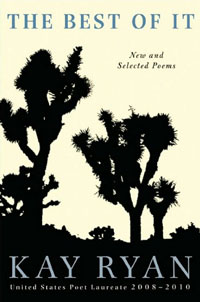National Welding Month

The fact that April is designated National Poetry Month (by what governing body escapes me, though I would not be surprised to learn that the pack of scoundrels in our Congress had lent their sketchy imprimatur to it) might have some meaning if it were not competing with National Stress Month, National Kite Month, National Sexually Transmitted Diseases (STD) Awareness Month, National Autism Awareness Month, National Child Abuse Prevention Month, National Organ Donation Month, International Guitar Month, Keep America Beautiful Month, National Anxiety Month, National Humor Month, National Welding Month, National Garden Month, and Uh-Huh Month ad nauseum.
I am however reminded that of the variegated flora and fauna within my purview I do attend enough to the angels and monsters of the poetic firmament. Thus be forewarned that I may attempt to mend my negligence in days to come.
So what better way to begin than to give a moment or two to Kay Ryan, the PLOTUS, as Donald Hall coined the Poet Laureate od the United States.
As it happens Kay Ryan (Flamingo Watching) has a new (her seventh) collection, The Best of It: New and Selected Poems (Grove Press) out in the wide world, or at least at thoughtful booksellers. Ryan lives in California, where she has been teaching remedial English in Marin County (“I have tried to live very quietly, so I could be happy”) for over 30 years.
Kay Ryan sees poetry an intense personal experience—for the poet and the reader:
Poems are transmissions from the depths of whoever wrote them to the depths of the reader. To a greater extent than with any other kind of reading, the reader of a poem is making that poem, is inhabiting those words in the most personal sort of way. That doesn’t mean that you read a poem and make it whatever you want it to be, but that it’s operating so deeply in you, that it is the most special kind of reading.
From Ryan's “Great Thoughts”:
John Barr, president of The Poetry Foundation, speaks of reading Kay Ryan:
Halfway into a Ryan poem, one is ready for either a joke or a profundity; typically it ends in both. Before we know it the poem arrives at some unexpected, deep insight that likely will alter forever the way we see that thing.
